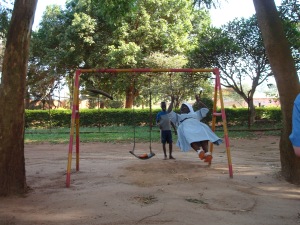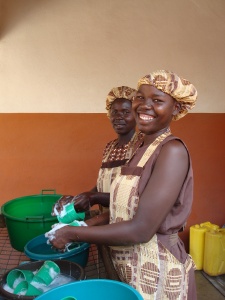– This post copied from my personal blog – written May 23 –
I returned today to Kampala from Gulu – a city in northern Uganda. We left early Tuesday morning and traveled about 200 miles. At home, this would take an average driver about 4 hours (or it would take me a bit longer after adding in time for every other Dairy Queen and any historical markers). It took us 6 hours, and it wasn’t because of frequent stops. It was because much of the road between Kampala and Gulu consists more of potholes than pavement. With sweet and capable Simon behind the wheel, we bobbed, weaved, zigged, zagged, and bounced our way to Gulu. Simon often ends up staying with the van while his passengers traipse around villages and farms, and I asked him if he thought his job was boring. He said no, he didn’t think that, so I asked him if it was because he got to meet a lot of crazy “mzungus” (the Swahili term for white people or tourists). He said he considered all the mzungus he met friends, crazy or not!
We stayed at Watoto’s Gulu guest house, which is being redecorated. It has been freshly painted, and our current hostess in Kampala journeyed with us to Gulu to finish helping the guest house staff recover chair seats as well as hang curtain rods and curtains. We even got to help her out a bit. = ) Directly outside our part of the guest house was a large mango tree, which is a very common site in that area. The courteous, friendly, and helpful staff prepared wonderful meals as well as fresh mango juice for us. I was tempted to climb the tree and try my hand at harvesting mango, but after I heard a rumor that a snake lived in the tree I decided to leave that to Isaac (one of the guest house staff).
Gulu is a wonderful place to see. It was one of the areas affected most during the civil war in Uganda that ended a few years ago. The smiles on the faces of many of the residents speak volumes about their resilience and how far they have come since the end of the war. Our first visit in Gulu was not connected to Watoto, but it was unforgettable and touching. In February, I got the privilege of hearing a seminar at OSU from Sister Rosemary Nyirumbe, who runs a school for girls in Gulu. She takes in girls with serious setbacks and disadvantages, teaching them skills and trades they can use to provide for themselves and become leaders in their community. Many people around the globe have heard of some of the atrocities that took place in Uganda during the civil war. The rebels killed parents, abducted children and made them child soldiers or slaves as they devastated the country. Many of the girls who came back had borne children to their captors, they missed the opportunity to attend school, and they had no one to whom they could return. Sister

Rosemary took them in, and while the war was still going on, she defended them against the rebels. She told us a story of when she faced a rebel soldier and told him to leave, because the woman he claimed was his wife had been his slave. She said she was not scared until later. Sister Rosemary also takes in orphans. The students at her school were on holiday when we visited, but we got to meet Patrick and Innocent. Patrick is a 10 year old boy who is healthy and happy now, but was dying when Sister Rosemary took him in. Innocent is an 8 year old boy who was born with no arms. His parents abandoned him because they thought he was a bad omen. Innocent is precious and a little mischievous. He loves to run and jump and swing on the swing set outside. The thing about Sister Rosemary that made the biggest impression on me was the obvious joy she had. She talked about suffering and courage during grim times with a smile as big as Texas (or Lake Victoria). She was overjoyed about the work God has done through her in the lives of hundreds of people in a war torn land.

Our next stop was at Living Hope – a women’s ministry connected to Watoto thatteaches women in the area how to become more self-sufficient. The women all take a discipleship course and a business course, then they choose a trade to learn. Some learn to sew, others learn to make peanut butter out of the locally grown peanuts (called ground nuts or g-nuts in Uganda), and others use Shea nuts to make and sell Shea butter. Many of the Living Hope women come from the same background as Sister Rosemary’s students, and Living Hope is meant to be a place of healing as well as learning.
The next place we visited near Gulu was a Watoto children’s village called Laminadera. At Laminadera, we met the village pastor, Victor, and his wife, Miriam. Laminadera is still growing, and is expected to have a total population near 1,000 people when it is at capacity. The property on which Laminadera sits has a few extra acres of land that will not be used for buildings. The pastor hopes that the land can be utilized for growing fruits to supplement the diets provided by Watoto for the children. I may get to help research and plan that while I am here! Some trees will grow with no maintenance here. No watering required – just plant a tree and let it grow. Other fruits, like pineapple plants, require more maintenance (but Ugandan pineapples are well worth it – I may or may not have consumed about 10 pineapples in the few days I have been here). The most fun part about visiting Laminadera was meeting George – a 17 year old Laminadera village resident who is currently gardening on some of the spare land and plans to study agriculture in college. He sells his crops and is saving for his own house. George loves agriculture – he says he cannot sleep at night unless he has gone and worked in the garden. He has done an excellent job with very limited resources!
Other than a very quick tour of the Watoto babies’ home at Gulu, the rest of our time was spent at the guest house reading, talking, laughing, listening, helping with the redecorating efforts, and eating lots and lots of mango.